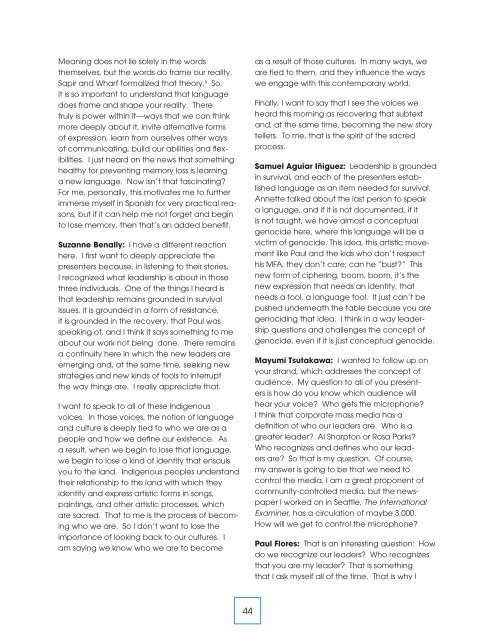The New Face of Arts Leadership in the West - westaf - The Western ...
The New Face of Arts Leadership in the West - westaf - The Western ...
The New Face of Arts Leadership in the West - westaf - The Western ...
You also want an ePaper? Increase the reach of your titles
YUMPU automatically turns print PDFs into web optimized ePapers that Google loves.
Mean<strong>in</strong>g does not lie solely <strong>in</strong> <strong>the</strong> words<br />
<strong>the</strong>mselves, but <strong>the</strong> words do frame our reality.<br />
Sapir and Wharf formalized that <strong>the</strong>ory. 6 So,<br />
it is so important to understand that language<br />
does frame and shape your reality. <strong>The</strong>re<br />
truly is power with<strong>in</strong> it—ways that we can th<strong>in</strong>k<br />
more deeply about it, <strong>in</strong>vite alternative forms<br />
<strong>of</strong> expression, learn from ourselves o<strong>the</strong>r ways<br />
<strong>of</strong> communicat<strong>in</strong>g, build our abilities and flexibilities.<br />
I just heard on <strong>the</strong> news that someth<strong>in</strong>g<br />
healthy for prevent<strong>in</strong>g memory loss is learn<strong>in</strong>g<br />
a new language. Now isn’t that fasc<strong>in</strong>at<strong>in</strong>g?<br />
For me, personally, this motivates me to fur<strong>the</strong>r<br />
immerse myself <strong>in</strong> Spanish for very practical reasons,<br />
but if it can help me not forget and beg<strong>in</strong><br />
to lose memory, <strong>the</strong>n that’s an added benefit.<br />
Suzanne Benally: I have a different reaction<br />
here. I first want to deeply appreciate <strong>the</strong><br />
presenters because, <strong>in</strong> listen<strong>in</strong>g to <strong>the</strong>ir stories,<br />
I recognized what leadership is about <strong>in</strong> those<br />
three <strong>in</strong>dividuals. One <strong>of</strong> <strong>the</strong> th<strong>in</strong>gs I heard is<br />
that leadership rema<strong>in</strong>s grounded <strong>in</strong> survival<br />
issues, it is grounded <strong>in</strong> a form <strong>of</strong> resistance,<br />
it is grounded <strong>in</strong> <strong>the</strong> recovery, that Paul was<br />
speak<strong>in</strong>g <strong>of</strong>, and I th<strong>in</strong>k it says someth<strong>in</strong>g to me<br />
about our work not be<strong>in</strong>g done. <strong>The</strong>re rema<strong>in</strong>s<br />
a cont<strong>in</strong>uity here <strong>in</strong> which <strong>the</strong> new leaders are<br />
emerg<strong>in</strong>g and, at <strong>the</strong> same time, seek<strong>in</strong>g new<br />
strategies and new k<strong>in</strong>ds <strong>of</strong> tools to <strong>in</strong>terrupt<br />
<strong>the</strong> way th<strong>in</strong>gs are. I really appreciate that.<br />
I want to speak to all <strong>of</strong> <strong>the</strong>se Indigenous<br />
voices. In those voices, <strong>the</strong> notion <strong>of</strong> language<br />
and culture is deeply tied to who we are as a<br />
people and how we def<strong>in</strong>e our existence. As<br />
a result, when we beg<strong>in</strong> to lose that language,<br />
we beg<strong>in</strong> to lose a k<strong>in</strong>d <strong>of</strong> identity that ensouls<br />
you to <strong>the</strong> land. Indigenous peoples understand<br />
<strong>the</strong>ir relationship to <strong>the</strong> land with which <strong>the</strong>y<br />
identity and express artistic forms <strong>in</strong> songs,<br />
pa<strong>in</strong>t<strong>in</strong>gs, and o<strong>the</strong>r artistic processes, which<br />
are sacred. That to me is <strong>the</strong> process <strong>of</strong> becom<strong>in</strong>g<br />
who we are. So I don’t want to lose <strong>the</strong><br />
importance <strong>of</strong> look<strong>in</strong>g back to our cultures. I<br />
am say<strong>in</strong>g we know who we are to become<br />
as a result <strong>of</strong> those cultures. In many ways, we<br />
are tied to <strong>the</strong>m, and <strong>the</strong>y <strong>in</strong>fluence <strong>the</strong> ways<br />
we engage with this contemporary world.<br />
F<strong>in</strong>ally, I want to say that I see <strong>the</strong> voices we<br />
heard this morn<strong>in</strong>g as recover<strong>in</strong>g that subtext<br />
and, at <strong>the</strong> same time, becom<strong>in</strong>g <strong>the</strong> new story<br />
tellers. To me, that is <strong>the</strong> spirit <strong>of</strong> <strong>the</strong> sacred<br />
process.<br />
Samuel Aguiar Iñiguez: <strong>Leadership</strong> is grounded<br />
<strong>in</strong> survival, and each <strong>of</strong> <strong>the</strong> presenters established<br />
language as an item needed for survival.<br />
Annette talked about <strong>the</strong> last person to speak<br />
a language, and if it is not documented, if it<br />
is not taught, we have almost a conceptual<br />
genocide here, where this language will be a<br />
victim <strong>of</strong> genocide. This idea, this artistic movement<br />
like Paul and <strong>the</strong> kids who don’t respect<br />
his MFA, <strong>the</strong>y don’t care; can he “bust?” This<br />
new form <strong>of</strong> cipher<strong>in</strong>g, boom, boom, it’s <strong>the</strong><br />
new expression that needs an identity, that<br />
needs a tool, a language tool. It just can’t be<br />
pushed underneath <strong>the</strong> table because you are<br />
genocid<strong>in</strong>g that idea. I th<strong>in</strong>k <strong>in</strong> a way leadership<br />
questions and challenges <strong>the</strong> concept <strong>of</strong><br />
genocide, even if it is just conceptual genocide.<br />
Mayumi Tsutakawa: I wanted to follow up on<br />
your strand, which addresses <strong>the</strong> concept <strong>of</strong><br />
audience. My question to all <strong>of</strong> you presenters<br />
is how do you know which audience will<br />
hear your voice? Who gets <strong>the</strong> microphone?<br />
I th<strong>in</strong>k that corporate mass media has a<br />
def<strong>in</strong>ition <strong>of</strong> who our leaders are. Who is a<br />
greater leader? Al Sharpton or Rosa Parks?<br />
Who recognizes and def<strong>in</strong>es who our leaders<br />
are? So that is my question. Of course,<br />
my answer is go<strong>in</strong>g to be that we need to<br />
control <strong>the</strong> media. I am a great proponent <strong>of</strong><br />
community-controlled media, but <strong>the</strong> newspaper<br />
I worked on <strong>in</strong> Seattle, <strong>The</strong> International<br />
Exam<strong>in</strong>er, has a circulation <strong>of</strong> maybe 3,000.<br />
How will we get to control <strong>the</strong> microphone?<br />
Paul Flores: That is an <strong>in</strong>terest<strong>in</strong>g question: How<br />
do we recognize our leaders? Who recognizes<br />
that you are my leader? That is someth<strong>in</strong>g<br />
that I ask myself all <strong>of</strong> <strong>the</strong> time. That is why I<br />
44


